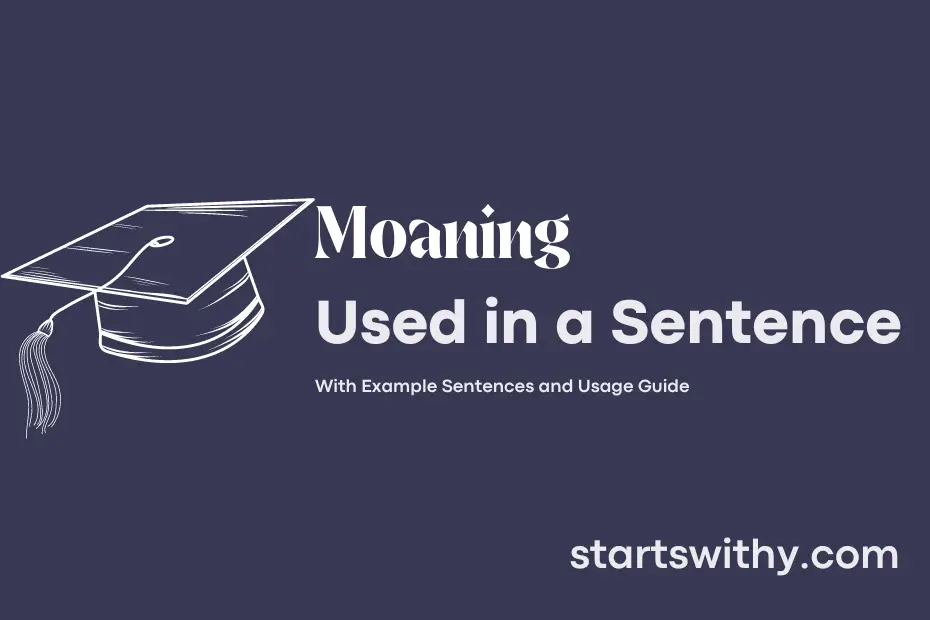Have you ever wondered what it means when someone is referred to as moaning? In its simplest definition, moaning is a vocal expression of pain, pleasure, or dissatisfaction.
When someone is moaning, they are usually making low, inarticulate sounds that reflect their emotions or physical sensations. This behavior is commonly associated with vocalizing discomfort or arousal, depending on the context.
7 Examples Of Moaning Used In a Sentence For Kids
- Moaning is a sound some animals make to show they are unhappy.
- When you are sick or hurt, you might start moaning because you don’t feel well.
- Sometimes when a person is tired, they might start moaning without even realizing it.
- If you hear someone moaning, it’s important to ask them if they need help.
- It’s okay to comfort someone who is moaning to make them feel better.
- Remember to be kind and understanding towards someone who is moaning.
- Let’s all try to be patient and caring when we hear someone moaning.
14 Sentences with Moaning Examples
- Moaning in frustration over pending assignments is a common sight in the college library.
- The sound of moaning can often be heard from the dorm rooms during exam season.
- Group projects often lead to students moaning about their uncooperative team members.
- Moaning can be heard from the lecture hall when the professor assigns surprise quizzes.
- The cafeteria is filled with students moaning over the lack of variety in the menu.
- Late-night study sessions usually end with students moaning about the amount of work they still have left.
- The students in the back row were caught moaning about how boring the lecture was.
- The stress of college life can sometimes lead to students moaning about their hectic schedules.
- The long line at the photocopy machine had students moaning about the slow service.
- The constant moaning about poor internet connectivity in the hostel is a common complaint among students.
- The moaning coming from the sports field indicated that the team was facing a tough competition.
- The lack of feedback on assignments had students moaning about the unclear grading criteria.
- Students were heard moaning about the lack of study materials for their upcoming exams.
- The sudden change in the exam schedule had students moaning about having to rearrange their study plans.
How To Use Moaning in Sentences?
To moan is to express dissatisfaction or discomfort audibly, often in a low, mournful sound. When using this word in a sentence, it is crucial to consider the context and tone in which it is being used.
Here are some tips on how to use moan effectively in a sentence:
-
Verb: When using moan as a verb, it typically describes the act of making a low, prolonged sound as an expression of pain, pleasure, or dissatisfaction. For example: “He began to moan in pain after falling off his bike.”
-
Noun: As a noun, moan refers to the sound itself or a prolonged, low sound of complaining or suffering. For example: “The ghostly moan echoed through the empty hallway.”
-
Adjective: Occasionally, moan can be used as an adjective to describe something that produces a low and mournful sound. For example: “The moaning wind added to the eerie atmosphere of the abandoned house.”
Remember, using moan in a sentence is about conveying emotion and setting a particular mood. Whether it is to describe physical pain, emotional distress, or a spooky atmosphere, the word moan can be a powerful tool in your writing. Experiment with different contexts and practice incorporating this word into your vocabulary to become more comfortable using it effectively.
Conclusion
In various scenarios, sentences with moaning suggest sounds of discomfort, pleasure, or fatigue. These utterances can convey a range of emotions and responses, from pain and dissatisfaction to contentment and satisfaction. Moaning in sentences can indicate physical strain or enjoyment, serving as a vocal expression of sensations experienced by an individual.
Whether in the context of physical exertion, intimacy, or expressing dissatisfaction, sentences with moaning illustrate the diverse ways in which vocalizations can communicate feelings and reactions. By incorporating moans into language, individuals can convey their emotions and experiences more vividly, adding depth and nuance to their expressions.



